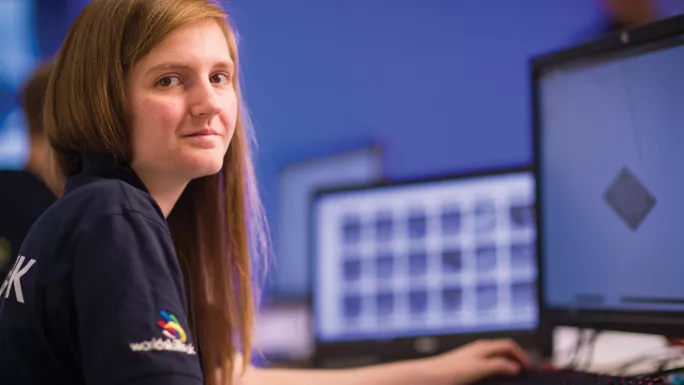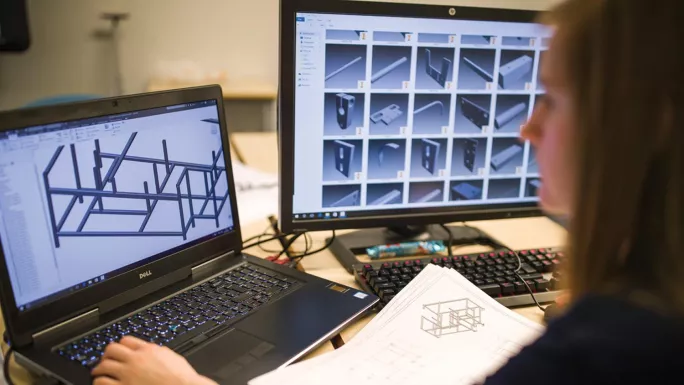The mission: fit a week’s work into just six hours

In the words of her teacher, Betsy Crosbie is “in the zone”. Her headphones drown out the noise around her and her eyes remain focused on the computer screen as she works her way through the exercises in front of her. Nothing can distract her - not the other students in the room, nor the people who keep walking in and out.
This is a crucial skill for her to develop, because next week she will find herself at a workstation among dozens of competitors from across Europe, trying to pull off the performance of a lifetime.
Crosbie will be one of 23 members of Team UK for EuroSkills 2016 in Gothenburg, Sweden, a continent-wide skills competition (see box, below). She will be participating in the mechanical engineering contest, specifically in the computer-aided design (CAD) category.
The 20-year-old from East Kilbride in Scotland completed an HND in computer-aided draughting and design at New College Lanarkshire and, after some time working in industry, returned to college to study for an HNC in mechanical engineering. In the final month before she competes in Gothenburg, Crosbie has been training on an almost daily basis.

‘It will be worth it’
“It is a lot of training,” Crosbie says. “It is a lot of work, but it will be worth it in the end.”
Her main concern, she explains, is remaining focused on the task in hand while some 450 competitors are working around her. “If I can stay in the zone, I will be fine,” she says. “Even if I don’t get a medal over there, I will be proud just for getting to that point.”
In the build-up to competing in Sweden, Crosbie has already been through a gruelling selection process of regional and national competitions, culminating in winning a silver medal at WorldSkills UK in Birmingham last year. Since June, she has put in at least three full days of training every month, often with additional work in the evenings.
‘The growth from when they start to when they compete is massive’
On her way to Gothenburg, Crosbie has managed to outshine two other competitors: Calum Waltho, a former New College Lanarkshire student, who won a bronze medal in Birmingham last year; and Michael Skora, from Southern Regional College in Northern Ireland, who won gold. But while Crosbie earned the place in Gothenburg, the three are still training together every month at New College Lanarkshire, and all are still in with a chance of competing in WorldSkills Abu Dhabi next year.
It is the combination of teamwork, support and competition that the trainers hope will push all three students to reach their potential and lead Crosbie to medal glory in Sweden. During their monthly sessions in Lanarkshire, they stay in halls of residence on campus to make the most of their time. This means that after a short break for dinner, they often work late into the night.

Building stamina
Barry Skea, assistant head of faculty for engineering and automotive at New College Lanarkshire and the WorldSkills UK expert for CAD, is responsible for training Crosbie and the two other students. “One of the things we have to build is stamina because, at competition, sleep becomes a non-entity,” he says.
Last month, for example, the trio’s task was to complete the project given to competitors at the WorldSkills competition in Leipzig in 2013. The time they were allocated was also much shorter than professionals would be given in the workplace.
“We are asking them to do it in six hours; in industry it might be a week,” Skea explains. “So speed is something they have to work on a lot.”
Training is not just about honing their skills, he adds: “They have to build their confidence. The technical skills are only about 60 per cent [of what they need to be successful].”
Skea continues: “I can’t express enough the growth of each competitor from when they started the process. The growth from when they start to when they compete is massive.”
Those taking part are not the only ones who benefit, according to Martin McGuire, principal of New College Lanarkshire.
“We see it as really important at the college that our students see the value in vocational training,” he says. “Our whole mantra is about skills. Things like WorldSkills raise ambition.”
You need a Tes subscription to read this article
Subscribe now to read this article and get other subscriber-only content:
- Unlimited access to all Tes magazine content
- Exclusive subscriber-only stories
- Award-winning email newsletters
Already a subscriber? Log in
You need a subscription to read this article
Subscribe now to read this article and get other subscriber-only content, including:
- Unlimited access to all Tes magazine content
- Exclusive subscriber-only stories
- Award-winning email newsletters